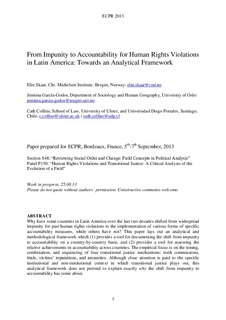| dc.contributor.author | Skaar, Elin | |
| dc.contributor.author | García-Godos, Jemima | |
| dc.contributor.author | Collins, Cath | |
| dc.date.accessioned | 2018-01-04T08:18:20Z | |
| dc.date.available | 2018-01-04T08:18:20Z | |
| dc.date.issued | 2013-01-01 | |
| dc.identifier | oai:www.cmi.no:5034 | |
| dc.identifier.citation | Presented at: ECPR, Bordeaux, France, 5th-7th September, 2013 | |
| dc.identifier.uri | http://hdl.handle.net/11250/2474859 | |
| dc.description.abstract | Why have some countries in Latin America over the last two decades shifted from widespread impunity for past human rights violations to the implementation of various forms of specific accountability measures, while others have not? This paper lays out an analytical and methodological framework which (1) provides a tool for documenting the shift from impunity to accountability on a country-by-country basis, and (2) provides a tool for assessing the relative achievements in accountability across countries. The empirical focus is on the timing, combination, and sequencing of four transitional justice mechanisms: truth commissions, trials, victims’ reparations, and amnesties. Although close attention is paid to the specific institutional and non-institutional context in which transitional justice plays out, this analytical framework does not pretend to explain exactly why the shift from impunity to accountability has come about. | |
| dc.language.iso | eng | |
| dc.relation.uri | https://www.cmi.no/publications/5034-from-impunity-to-accountability-for-human-rights | |
| dc.subject | Human Rights | |
| dc.subject | Transitional Justice | |
| dc.subject | Impunity | |
| dc.subject | Accountability | |
| dc.subject | Latin America | |
| dc.title | From Impunity to Accountability for Human Rights Violations in Latin America: Towards an Analytical Framework | |
| dc.type | Conference object | |
